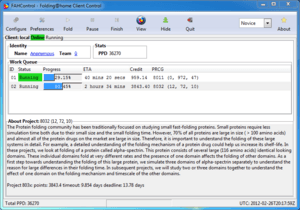Folding@home facts for kids
Folding@Home is a special computer project. It helps scientists at Stanford University understand and fight diseases. Our bodies have tiny parts called proteins. When these proteins don't work correctly, they can make us sick. Diseases like Alzheimer's, Mad Cow disease, and many types of cancer are linked to these faulty proteins.
This project uses the spare power of thousands of personal computers. These computers belong to volunteers who install the Folding@Home software. Instead of one huge, expensive supercomputer, many smaller computers work together. This way, they can solve very big problems. The software first ran on the Sony PlayStation 3. It can also work inside a Google Chrome web browser. Now, you can even run it on many Android mobile devices.
Contents
What are Proteins?
Proteins are like tiny machines inside your body. They do almost everything! They help build your body, fight germs, and even carry oxygen. Each protein has a special shape. This shape helps it do its job.
How Proteins Fold
Proteins start as long chains. Then, they fold into a specific 3D shape. This folding process is very important. If a protein folds the wrong way, it can't do its job. Sometimes, it can even become harmful.
Why Folding Matters for Health
When proteins fold incorrectly, they can cause serious health problems. For example, in Alzheimer's, certain proteins misfold. They then clump together in the brain. This damages brain cells. Folding@Home helps scientists study how proteins fold. This research can lead to new medicines. It helps find ways to fix or prevent these bad folds.
How Folding@Home Works
Folding@Home is a type of distributed computing. This means it uses many computers working together. Think of it like a huge team project.
Your Computer Helps Science
When you install the software, your computer gets small tasks. These tasks are like tiny pieces of a big puzzle. Your computer works on these tasks when you are not using it. For example, it might work while you are sleeping. Then, it sends the results back to Stanford.
More Power Than a Supercomputer
By combining the power of thousands of computers, Folding@Home becomes very strong. It can even be more powerful than the fastest supercomputers. This allows scientists to run many complex simulations. These simulations help them understand protein folding much faster.
Where You Can Run It
The Folding@Home software is very flexible.
- It started on the PlayStation 3.
- You can run it in a Google Chrome web browser.
- It is also available for many Android phones and tablets.
- It runs on regular computers with Microsoft Windows, macOS, and Linux.
Images for kids
See also
 In Spanish: Folding@home para niños
In Spanish: Folding@home para niños
 | Jessica Watkins |
 | Robert Henry Lawrence Jr. |
 | Mae Jemison |
 | Sian Proctor |
 | Guion Bluford |






